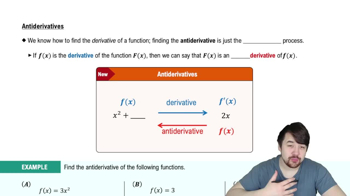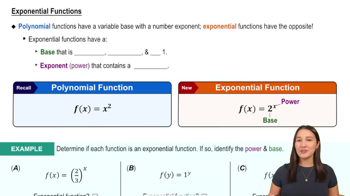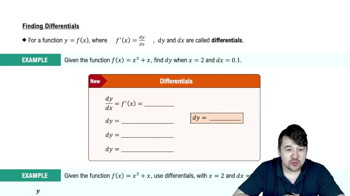Give the antiderivatives of 1/x.
Table of contents
- 0. Functions7h 55m
- Introduction to Functions18m
- Piecewise Functions10m
- Properties of Functions9m
- Common Functions1h 8m
- Transformations5m
- Combining Functions27m
- Exponent rules32m
- Exponential Functions28m
- Logarithmic Functions24m
- Properties of Logarithms36m
- Exponential & Logarithmic Equations35m
- Introduction to Trigonometric Functions38m
- Graphs of Trigonometric Functions44m
- Trigonometric Identities47m
- Inverse Trigonometric Functions48m
- 1. Limits and Continuity2h 2m
- 2. Intro to Derivatives1h 33m
- 3. Techniques of Differentiation3h 18m
- 4. Applications of Derivatives2h 38m
- 5. Graphical Applications of Derivatives6h 2m
- 6. Derivatives of Inverse, Exponential, & Logarithmic Functions2h 37m
- 7. Antiderivatives & Indefinite Integrals1h 26m
- 8. Definite Integrals4h 44m
- 9. Graphical Applications of Integrals2h 27m
- 10. Physics Applications of Integrals 3h 16m
- 11. Integrals of Inverse, Exponential, & Logarithmic Functions2h 31m
- 12. Techniques of Integration7h 41m
- 13. Intro to Differential Equations2h 55m
- 14. Sequences & Series5h 36m
- 15. Power Series2h 19m
- 16. Parametric Equations & Polar Coordinates7h 58m
7. Antiderivatives & Indefinite Integrals
Antiderivatives
Problem 4.9.19
Textbook Question
Finding antiderivatives. Find all the antiderivatives of the following functions. Check your work by taking derivatives.
ƒ(x) = eˣ
 Verified step by step guidance
Verified step by step guidance1
Step 1: Recall the definition of an antiderivative. An antiderivative of a function ƒ(x) is a function F(x) such that F'(x) = ƒ(x).
Step 2: Identify the given function ƒ(x) = eˣ. Note that the derivative of eˣ is itself, meaning eˣ is its own antiderivative.
Step 3: Write the general form of the antiderivative. Since the derivative of a constant is zero, the antiderivative of eˣ includes an arbitrary constant C. Thus, F(x) = eˣ + C.
Step 4: Verify your result by differentiating F(x). Compute F'(x) = d/dx [eˣ + C]. Using the derivative rules, F'(x) = eˣ, which matches the original function ƒ(x).
Step 5: Conclude that all antiderivatives of ƒ(x) = eˣ are given by F(x) = eˣ + C, where C is an arbitrary constant.
 Verified video answer for a similar problem:
Verified video answer for a similar problem:This video solution was recommended by our tutors as helpful for the problem above
Video duration:
2mPlay a video:
Key Concepts
Here are the essential concepts you must grasp in order to answer the question correctly.
Antiderivative
An antiderivative of a function is another function whose derivative is the original function. In calculus, finding antiderivatives is essential for solving problems related to integration. The general form of an antiderivative includes a constant of integration, C, since the derivative of a constant is zero, leading to multiple valid antiderivatives.
Recommended video:

Antiderivatives
Exponential Functions
Exponential functions are mathematical functions of the form f(x) = a^x, where 'a' is a positive constant. The function eˣ, where e is Euler's number (approximately 2.718), is a special case of an exponential function that has unique properties, particularly that its derivative is equal to itself. This property simplifies the process of finding antiderivatives for functions involving e.
Recommended video:

Exponential Functions
Verification by Differentiation
Verification by differentiation involves taking the derivative of the antiderivative found to ensure it matches the original function. This step is crucial in confirming the correctness of the antiderivative. If the derivative of the antiderivative equals the original function, it validates the solution and demonstrates a proper understanding of the relationship between differentiation and integration.
Recommended video:

Finding Differentials
Related Videos
Related Practice
Textbook Question
19
views


